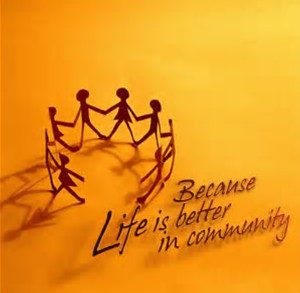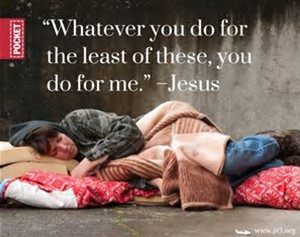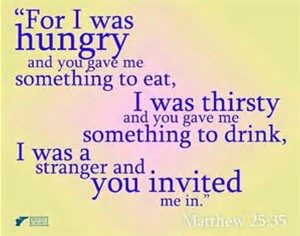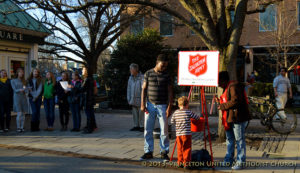Rev. Jana Purkis-Brash – February 5, 2017 – Isaiah 58: 1-12
As we as a faith community think together about what life in community means for us, I share with you this quote from a favorite author/thinker, Eugene Peterson . He says, “There can be no maturity in the spiritual life, no obedience in following Jesus, no wholeness in the Christian life, apart from an immersion in, and embrace of, community. I am not myself by myself.”
. He says, “There can be no maturity in the spiritual life, no obedience in following Jesus, no wholeness in the Christian life, apart from an immersion in, and embrace of, community. I am not myself by myself.”
Each of the Old Testament passages for this month, Isaiah, Deuteronomy, Leviticus, Exodus speaks about God’s intentions around our living in community. This month we will explore what it means to live and serve as God’s people not just as individuals but also in community.
Looking about him at the needs of the homeless, the hungry and the oppressed, Isaiah could no longer keep still. The self-indulgent displays of sackcloth and ashes, he declares, are not acceptable to God! The only true way to observe a fast is by liberating the oppressed, sharing your bread with the hungry, and opening your own house to the homeless!
So let’s go right to the Isaiah text and examine it in a few different ways. At the literal level, and this may be the only time you ever hear me talk about a Bible passage literally, this passage is a prophetic encouragement to the people of God (1) to actively do justice for the oppressed and (2) to show mercy to the most vulnerable. The prophet lists these most vulnerable as the hungry, the homeless, and the naked, all of whom, he says, are “your own flesh.” By this last phrase the prophet relies on the teaching of ;Genesis. 1 and 2 all humans are bone of each-other’s bones and flesh of each-other’s flesh. The prophet understands that all humans are family, for we share a common ancestor. For the prophet, it is only sin that keeps us from acknowledging that we are family, and living as family.
 The prophet says that doing such acts of justice and mercy will result in the rapid healing of the people of God. It will result in a renewed and improved relationship with God, in which God’s people communicate with God freely: “Then you shall call, and the Lord will answer; you shall cry, and he will say, Here I am.” God’s people will experience God’s presence.
The prophet says that doing such acts of justice and mercy will result in the rapid healing of the people of God. It will result in a renewed and improved relationship with God, in which God’s people communicate with God freely: “Then you shall call, and the Lord will answer; you shall cry, and he will say, Here I am.” God’s people will experience God’s presence.
To ponder an allegorical sense of this scripture, think of Christ’s own example of doing justice and mercy. This passage gives the people of God in the Old Testament an early glimpse of the heart and way of Jesus Christ, and it refreshes our vision of the same. In Jesus’ life and ministry we see him feed the hungry, defend the oppressed, he stands up for women’s right, he loves the outcast, the despised, the rejected, and the sinner, and calls on the rich and powerful to give their money to the poor. Similarly, by sharing in Christ’s merciful self-offering, we share in his merits, most especially in the eternal life he has merited.
With an eye to the moral sense of this passage, we find it right on the surface: we must do the works of justice and mercy the Lord’s prophet tells us to do, using Jesus as our example: both in the things Jesus himself did in the flesh, and in the ways Jesus’ way is multiplied before our imagination by the Christ-patterns of the saints.
Finally in the anagogical sense: Surprisingly, the inspired prophet says “your light will break forth like the dawn.” God’s light becomes our light, for the Church is betrothed to Christ. When we do acts of mercy and justice, we genuinely participate in the eternal and intelligible light who is the Holy Trinity.
Acts of justice and mercy, because they are acts of love, allow us to partake in the divine nature. Acts of justice and mercy are acts of worship, by which we glimpse the comforting presence of the Father, Son, and Holy Spirit: we sense that “the glory of the Lord” is our “rear guard.” God protects us, and we glimpse God’s glory (behind us, guiding & protecting us) out of the corner of our eye, though we do not yet see God face to face. We should not miss the opportunity to give acts of justice and mercy to all, especially those in need; for we are most in need ourselves, and God has given us mercy and justification. St. Gregory Nazianzus reminds us that Christians do not just have altars inside church buildings; anytime we see a beggar, there is God’s altar, awaiting our offerings.
In Isaiah 58, the prophet tells the people something they probably already know and don’t want to hear. They are rebellious and do not have the right attitude in their hearts and minds to make their fasts acceptable.
Looking to Jesus as our example, his ministry was not a mission of words; it was a mission of acts. All four of the gospels could rightly be renamed a “Book of Acts” (we could have volumes 1-4 plus volume 5 for the “Acts of the Apostles”). Jesus walked among the people, walked in the same dusty roads and along the same smelly fishing lines, as the people he spoke to and offered a new vision of faith and fulfillment. With Jesus’ appearance the fulfillment of God’s righteousness on earth became a possibility for the first time.
It was Isaiah’s words that Jesus incarnated to their fullest extent. He offered healing and wholeness, forgiveness and fulfillment, divine love and compassion, to every person he encountered. That is how the “kingdom of God” became both “now” and “not yet,” both present, yet still in the future, for all who follow in his footsteps on “The Way.”
Remember, this is how the earliest Christians were known, not as “Christians,” but as “Followers of the Way.” In other words, people who walked the paths of justice and mercy and peace.
Isaiah’s call for deeds of justice along with pious behavior is echoed by Jesus in those famous words in Matthew 25. A modern writer has written:
 I was hungry, and you formed a humanities club and discussed my hunger. Thank you. I was imprisoned, and you crept off quietly to your chapel and prayed for my release. I was naked, and in your mind, you debated the morality of my appearance. I was sick, and you knelt beside your bed and thanked God for your health. I was homeless, and you preached to me about the spiritual shelter of the love of God. I was lonely, and you left me alone to pray for myself. You seem so holy, so close to God, but I am still hungry, and lonely and cold. What does it profit a person to page through their book of prayers when the rest of the world is crying out for help?
I was hungry, and you formed a humanities club and discussed my hunger. Thank you. I was imprisoned, and you crept off quietly to your chapel and prayed for my release. I was naked, and in your mind, you debated the morality of my appearance. I was sick, and you knelt beside your bed and thanked God for your health. I was homeless, and you preached to me about the spiritual shelter of the love of God. I was lonely, and you left me alone to pray for myself. You seem so holy, so close to God, but I am still hungry, and lonely and cold. What does it profit a person to page through their book of prayers when the rest of the world is crying out for help?
Isaiah’s message is also a plea to God’s people to love and to show generosity in the same ways that God has loved us. Isaiah has no patience for those who claim that what happens in politics, in government, in society, in the business world, or in military affairs is of no concern to the church. For Isaiah, God is Lord over all of life, and that means that God is much more than a small compartment labeled “formal religion.” God is holy, and a moral God demands moral holiness in all of life.
The familiar words of Sir George MacLeod to the Iona Community in Scotland still speak of God’s call to carry our faith into all of life. MacLeod wrote: “I simply argue that the cross be raised again at the center of the marketplace as well as on the steeple of the church. I am for recovering the claim that Jesus was not crucified in a cathedral between two candles, but on a cross between two thieves, on the town garbage heap, at a place so cosmopolitan, they had to write his title in Hebrew, Latin and Greek; at the kind of place where cynics talk smut, soldiers gamble and thieves curse; because that is where Christ died, and that is what Christ died about, and that is where church people ought to be, and what church people should be about.”
 Closing the gap between belief and behavior is not something we will ever do in our human strength and wisdom, but in the power of God’s Spirit, all things are possible. The answer to so much that is wrong in our world has come in Jesus Christ, who in reconciling us to God, brings us to a place where we can be reconciled to one another. Only then shall “light break forth like the dawn, and righteousness shall go before you.”
Closing the gap between belief and behavior is not something we will ever do in our human strength and wisdom, but in the power of God’s Spirit, all things are possible. The answer to so much that is wrong in our world has come in Jesus Christ, who in reconciling us to God, brings us to a place where we can be reconciled to one another. Only then shall “light break forth like the dawn, and righteousness shall go before you.”
Written by Isabella Dougan
